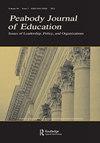新冠肺炎期间多国穆斯林母亲学者的阈限:女权主义合作的自我民族志
Q2 Social Sciences
引用次数: 1
摘要
2019冠状病毒病(COVID-19)大流行下的美国当前生活,让肩负育儿责任的学者的支持结构变得更加脆弱。尤其是那些学院派母亲,她们不得不努力应对全球大流行造成的社会和制度变化的影响。作为两名早期从事跨国职业的穆斯林母亲学者,我们问自己,这些变化是如何影响我们自己在学术、就业市场导航、母亲身份、照顾孩子的责任和惯例、家庭传统以及通过女权主义自我民族志进行的宗教观察方面的纠结的。我们使用“阈限空间”的概念作为我们的理论基础。通过日记条目和分析备忘录收集数据,并组成四篇短文来(代表)呈现分析。这些小插曲展示了西方占主导地位和非主导地位的空间如何告知作者的身份在COVID-19大流行的最初几个月里如何被打断、沉默、争议,并与不断变化的社会和制度期望陷入紧张关系。我们的研究对高等教育管理者有启示意义,他们希望了解他们的国际、穆斯林、母性员工的生活经历和障碍,对那些经历过类似复杂和不断变化的身份的母性学者也有启示意义。本文章由计算机程序翻译,如有差异,请以英文原文为准。
The Liminality of Multinational Muslim MotherScholaring during COVID-19: A Feminist Collaborative Autoethnography
ABSTRACT Current life in the US under the COVID-19 pandemic makes visible the fragility of supportive structures for academics with childcare responsibilities. Particularly academic mothers are left grappling with the impact of social and institutional shifts that took place due to the global pandemic. We, two early career multinational and Muslim MotherScholars, ask ourselves how these shifts are affecting our own entanglements of scholarship, job market navigation, motherhood, childcare responsibilities and routines, family traditions, and religious observation through feminist autoethnography. We used the concept of “liminal space” as our theoretical foundation. Data were collected through journal entries and analytic memos, and four vignettes were composed to (re)present the analysis. The vignettes display how Western dominant and nondominant spaces inform the ways in which the authors’ identities are interloped, muted, contested, and thrown into tension with changing social and institutional expectations during the early months of the COVID-19 pandemic. Our research has implications for higher education administrators who wish to gain a glimpse into the lived experiences and barriers of their international, Muslim, mothering employees, and for MotherScholars who live through similar complex and shifting identities to see validation and representation.
求助全文
通过发布文献求助,成功后即可免费获取论文全文。
去求助
来源期刊

Peabody Journal of Education
Social Sciences-Education
CiteScore
2.20
自引率
0.00%
发文量
43
期刊介绍:
Peabody Journal of Education (PJE) publishes quarterly symposia in the broad area of education, including but not limited to topics related to formal institutions serving students in early childhood, pre-school, primary, elementary, intermediate, secondary, post-secondary, and tertiary education. The scope of the journal includes special kinds of educational institutions, such as those providing vocational training or the schooling for students with disabilities. PJE also welcomes manuscript submissions that concentrate on informal education dynamics, those outside the immediate framework of institutions, and education matters that are important to nations outside the United States.
 求助内容:
求助内容: 应助结果提醒方式:
应助结果提醒方式:


